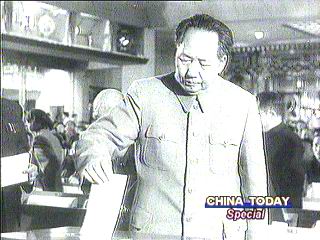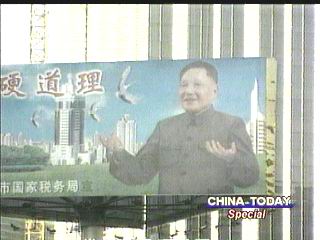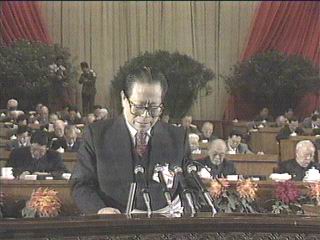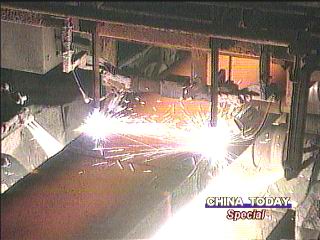1001 Edition: Constitutions
On October 1st, 1949 a grand ceremony was held in Beijing to mark the founding of the People's Republic of China.
Although nowadays Chinese are familiar with the March of the Volunteers and the Five-Star Red Flag, they might not know how they were chosen as the national anthem and the national flag.
After the "May First Appeal" was issued, leading democratic figures like Li Jishen, He Xiangning, Shen Junru, Zhang Bojun and Ma Xulun sent telegrams to Chinese everywhere. They called on them to unite and work hard for the founding of the new China. In August, 1948, groups upon groups of democratic members were secretly sent to the northeast and north China's liberated areas. They were about to see the dawning of an era they had long been struggling for. On January 31, 1949, Beiping(Beijing)was peacefully liberated. In March of the same year, chief leaders of the Central Committee of the Communist Party of China arrived at Beiping's Xiyuan Airport. It was here that Chairman Mao Zedong met with the democratic representatives from home and abroad who came to attend the Chinese People's Political Consultative Conference(CPPCC).
 On June 15th, 1949, the preparatory meeting of the first CPPCC was held in Beijing. It comprised six groups. They were in charge of different tasks such as naming members and departments' representatives to the CPPCC, drafting a Common Program, and deciding on a plan for a national flag and anthem. On July 15th, 1949, the People's Daily published the plan to solicit, from the general public, suggestions on a national flag and anthem. After careful sifting through all the amassed ideas and repeated discussions, the Five-Star Red Flag was designated as the national flag and the March of the Volunteers was selected as the national anthem.
On June 15th, 1949, the preparatory meeting of the first CPPCC was held in Beijing. It comprised six groups. They were in charge of different tasks such as naming members and departments' representatives to the CPPCC, drafting a Common Program, and deciding on a plan for a national flag and anthem. On July 15th, 1949, the People's Daily published the plan to solicit, from the general public, suggestions on a national flag and anthem. After careful sifting through all the amassed ideas and repeated discussions, the Five-Star Red Flag was designated as the national flag and the March of the Volunteers was selected as the national anthem.
On September 21, 1949, the First Session of the CPPCC opened in Beijing. It elected the Central People's Government Council. Mao Zedong was elected chairman of the Council and Zhou Enlai was among those elected as vice chairmen. It passed the Common Program of CPPCC and decided on the People's Republic of China as the name of new China.
The Common Program of CPPCC acted as a temporary constitution. It ruled that the People's Republic of China was a new democratic country run by the people, namely under the leadership of the working class and based on worker-peasant alliance with the participation of people from all walks of life and all ethnic groups. It also stipulated China's new domestic and foreign policies. Over the years, many historians raised different interpretations as to why socialism was not mentioned in the Common Program. What is the real situation behind this?
The founding of the People's Republic evoked great enthusiasm across China. Under the leadership of the Communist Party of China, Chinese of all ethnic groups and from all circles worked hard to rejuvenate the economy. In a short time the output of agricultural produce and industrial products, all surpassed previous bests of those in the old China. An independent and self-reliant new China was rising in the east.
With the rapid economic recovery and social order gradually becoming stable, it became indispensable for the state to have a constitution to accurately and fully reflect the people's will. And a supreme organ of power, which can exercise the rights of the constitution, is also needed. After several years of pondering and preparing as well as general elections nationwide, in the latter half of 1954, the time was ripe to set up a national congress system.
The First National People's Congress held its first session in Beijing in September 1954. Chairman Mao Zedong addressed the meeting. He pointed out that the force at the core leading our cause forward is the Chinese Communist Party and the theoretical basis guiding our thinking is Marxism-Leninism. In his government work report, Premier Zhou Enlai first mentioned the great tasks for the country: building a modern industry, a modern agriculture, a modern infrastructure, and a modern national defense system. Deputy Liu Shaoqi, delivered a report on the draft of the constitution of the PRC on behalf of the constitution drafting committee. The first NPC session unanimously passed China's Constitution, which says clearly that the People's Republic of China is a people's democratic country under the leadership of the working class and under the basis of worker-peasant alliance. All rights of the People's Republic of China belong to the people,who exercise their rights through the NPC. The organizational principle of the NPC, local people's congresses and other state organizations is democracy through centralized guidance. The constitution noted down the general line and task of the Communist Party of China in the transitional period and also regulated transitional measures and steps in striding towards socialism. It also stipulated the state functions, the broad freedom and rights and obligations of citizens, as well as ethnic and foreign policies.
During the early period of China's first constitution and the First Five-Year Plan period from 1953 to 1957, China's socialist economy achieved great progress and the country began its industrialization process. The 156 large projects of the First Five Year Plan laid down a solid foundation for industry. Also in this period, the transformation of agriculture, handicrafts industry, and capitalists' businesses and commerce were also completed. The Constitution, as the country's fundamental law, was carried out and guaranteed.
The Second Constitution
The expansion of Anti-Rightists Struggle in 1957 and the Great Leap Forward in 1958 seriously disrupted the normal operation of the country's political and economic life, and to some extent impaired the process of China's democratic political construction. The Third National People's Congress convened its first session in January of 1965. This was the first and also the last meeting convened by the 3rd NPC over the following eight years of time,due to the Cultural Revolution from 1966 to 1976. The NPC in reality lost its role as the highest organ of power and only existed in name. Local people's congresses across the country were totally smashed. Instead, NPC's functions were replaced by the Revolutionary Committee which had the powers of the Party, the government and the military, as well as the right to investigate and pass verdicts. The socialist democracy and legal system gradually established since the founding of the PRC were abolished. The constitution and laws lost their binding powers. Under this precarious situation, the Fourth NPC began to prepare for its meeting in 1974.
The Fourth National People's Congress held its first session in 1975, one year before the end of the Cultural Revolution. Deputies at the session made a lot of amendments to the old constitution. The 106 articles of the first constitution were trimmed down to only 30. This was the second constitution of the People's Republic of China.
1976 was a critical year in the history of the new republic.Premier Zhou Enlai, PLA's commander-in-chief Zhu De and chairman Mao Zedong died one after another. A massive earthquake struck Tangshan city in north China's Hebei province, killing more 240,000 people.The Gang of Four was crushed, ending a decade-long Cultural Revolution.The Fifth CPPCC held its first session in Beijing in 1978, 13 years after the Fourth CPPCC, .It passed a new CPPCC Charter and elected Deng Xiaoping chairman of the National Committee of CPPCC. Two days later, the Fifth National People's Congress convened and passed a new constitution, the third one of the new China.
The First Session of the Fifth NPC passed a 10-year development plan for China's national economy from 1976 to 1985. Due to the influence of leftist ideology, the plan did not fully anticipate the disparity of the national economy and stipulated the high-speed construction of 120 large projects. The execution of these projects not only caused financial difficulties for the state but also intensified the disparity of the national economy.
 1978 saw the successful holding of the Third Plenary Session of the 11th Party Central Committee. It was a new turning point in the history of development. It decided to shift the work emphasis of the Party and the State to economic construction, raising the curtain on reform and opening to the outside world and socialist modernization construction with Chinese characteristics. Besides mapping out the reform and opening up policies, Deng Xiaoping, together with his comrades-in-arms, was reflecting on stipulating a new constitution.
1978 saw the successful holding of the Third Plenary Session of the 11th Party Central Committee. It was a new turning point in the history of development. It decided to shift the work emphasis of the Party and the State to economic construction, raising the curtain on reform and opening to the outside world and socialist modernization construction with Chinese characteristics. Besides mapping out the reform and opening up policies, Deng Xiaoping, together with his comrades-in-arms, was reflecting on stipulating a new constitution.
A 103-member constitution-revising committee was set up, which was composed of all the members of the CPC Politburo and the Secretariat, NPC chairman and vice chairmen, CPPCC chairman and vice chairmen, as well as heads of all democratic parties.The Fifth Session of the Fifth NPC held in 1982 finally passed the amended constitution by secret ballot. This is the fourth constitution of PRC and is the best one. The stipulation of this constitution was of epoch-making significance.
It has four chapters and 138 articles, covering a prelude and an outline, the basic rights and obligations of citizens, state organs, as well as national flag, emblem and capital. It serves as the current executing constitution.
 The current constitution stipulates the three-step development strategy in China's modernization drive. The execution of household-contract-reponsibility system stimulated farmers'enthusiasm for production. Township enterprises developed rapidly and have made up half of China's overall economy. After the establishment of four special economic zones(SEZ),namely Shenzhen, Zhuhai,Shantou and Xiamen, 14 other coastal cities were opened up to the outside world. Later, China's most southern province of Hainan became the largest SEZ. Private economy engaging small business and industries emerged in cities, meanwhile, foreign capital began to flood into China. In cities, state-owned enterprise(SOE)embarked on the road of reform.
The current constitution stipulates the three-step development strategy in China's modernization drive. The execution of household-contract-reponsibility system stimulated farmers'enthusiasm for production. Township enterprises developed rapidly and have made up half of China's overall economy. After the establishment of four special economic zones(SEZ),namely Shenzhen, Zhuhai,Shantou and Xiamen, 14 other coastal cities were opened up to the outside world. Later, China's most southern province of Hainan became the largest SEZ. Private economy engaging small business and industries emerged in cities, meanwhile, foreign capital began to flood into China. In cities, state-owned enterprise(SOE)embarked on the road of reform.
During early 1992, the Shenzhen and Zhuhai SEZs were among the places Deng Xiaoping visited, he delivered a series of important speeches on deepening reform and opening up to the outside world. The 14th National Congress of the CPC held later in the year decided that the objective of China's economic restructuring was to set up the socialist market economic system. The First Session of the 8th NPC held in March of 1993 elected Jiang Zemin president of the People's Republic of China. It also discussed and approved the constitutional amendments and highlighted the concrete content of reform and opening up.
From 1991 to 1995 China completed its Eighth Five Year Plan, during which the country made outstanding achievements in various fields. The annual GDP growth rate during the Eighth Five Year Plan was 12 percent, which has been the fastest growing and the most stable five year period.Industries in all fields coordinated development. 845 large and medium-sized infrastructure projects were set up and went into production. Breakthroughs were made in economic and structural reforms. A socialist market economy was gradually being set up. Multi-layer and various other opening up proceedures were also set up. Foreign trade grew rapidly with an increased use of foreign capitals.
1998 saw the Ninth CPPCC National Committee and the Ninth NPC opened with a two-day-time difference. The First Session of the 9th NPC elected Jiang Zemin again president and chairman of the Central Military Commission. The Second Session of the 9th NPC held in 1999 passed constitutional amendments.
 From 1996 to 2000, China finished the Ninth Five Year Plan. To check the overheated economy and inflation, the government adopted in-time macro economic control and flexible counter measures, thus realising a soft landing of the economy. Facing pressure from the Asian Financial Crisis, the Chinese government tried very hard to keep the Renminbi stable and not devalue the currency. This contributed to the rejuvination of the economies in south-east Asian countries and the stability of the world economy. State-owned enterprises basically escaped a dire situation and things turned for the better. Ministries and departments under the State Council successfully conducted restructering and changed functions. Human resources were better distributed and diverted. In the face up to economic globalization,China's economy has been maintaining a strong development momentum, with the national GDP growing at a healthy rate.
From 1996 to 2000, China finished the Ninth Five Year Plan. To check the overheated economy and inflation, the government adopted in-time macro economic control and flexible counter measures, thus realising a soft landing of the economy. Facing pressure from the Asian Financial Crisis, the Chinese government tried very hard to keep the Renminbi stable and not devalue the currency. This contributed to the rejuvination of the economies in south-east Asian countries and the stability of the world economy. State-owned enterprises basically escaped a dire situation and things turned for the better. Ministries and departments under the State Council successfully conducted restructering and changed functions. Human resources were better distributed and diverted. In the face up to economic globalization,China's economy has been maintaining a strong development momentum, with the national GDP growing at a healthy rate.
In 1997 and in 1999, the Chinese government resumed the exercise of sovereignty over Hong Kong and Macao respectively, realizing the great concept of 'One Country Two Systems' by late senior leader Deng Xiaoping. The Basic Law on the Hong Kong Special Administrative Region passed by the Third Session of the Seventh NPC in 1990 and the Basic Law on the Macao Special Administrative Region passed by the First Session of the Eighth NPC in 1993 laid solid foundation for the smooth return of Hong Kong and Macao to the motherland. The constitution as the state's basic law played a great role in the peaceful reunification of the motherland. The CPPCC and NPC are held annually, continuously progressing in various fields. The most prominent one is the legislature. A strong and reliable constitution is the basis for running a country. The NPC and CPPCC are expected to gradually perfect the constitution to ensure the country has a complete legal system to best protect the interests of the people and the state.
--End--
|